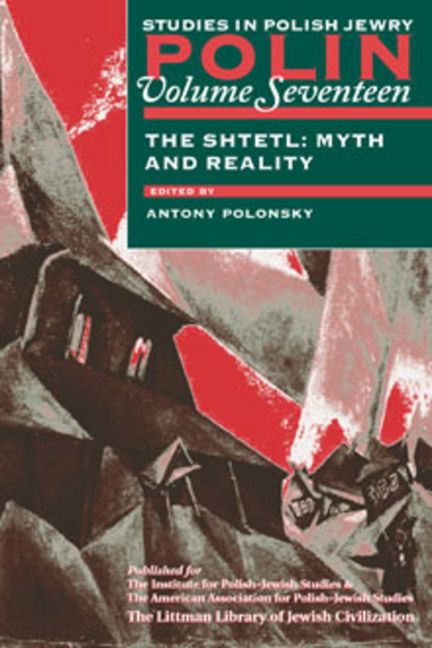Book contents
- Frontmatter
- Dedication
- Editors and Advisers
- Preface
- Polin
- Polin: Studies inPolish Jewry
- Contents
- Note on Place Names
- Note on Transliteration
- List of Abbreviations
- PART I THE SHTETL: MYTH AND REALITY
- PART II NEW VIEWS
- PART III DOCUMENTS
- PART IV THE SIXTY-FIFTH ANNIVERSARY OF EVENTS IN PRZYTYK: A DEBATE
- PART V REVIEWS
- Chone Shmeruk, Hakeriyah lenavi: meḥkerei historiyah vesifrut, edited by Israel Bartal; Chone Shmeruk, Ayarot ukerakhim: perakim beyetsirato shel shalom aleikhem, edited by Chava Turniansky
- Anna Michałowska, Między demokracją oligarchią: Władze gmin żydowskich w Poznaniu i Swarzędzu
- Magdalena Sitarz, Yiddish and Polish Proverbs: Contrastive Analysis Against Cultural Background
- Shmuel Feiner and David Sorkin (eds.), New Perspectives on the Haskalah
- Brian Porter, When Nationalism Began to Hate: Imagining Modern Politics in Nineteenth-Century Poland
- Irena Janicka-Świderska, Jerzy Jarniewicz, and Adam Sumera (eds.), Jewish Themes in English and Polish Culture
- Nancy L. Green (ed.), Jewish Workers in the Modern Diaspora
- Gertrud Pickhan, ‘Gegen den Strom’. Der Allgemeine Jüdische Arbeiterbund ‘Bund’ in Polen, 1918–1939
- Anna Cichopek, Pogrom Żydów w Krakowie, 11 sierpnia 1945 r.
- Michał Horoszewicz, ‘Przez dwa millenia do rzymskiej synagogi’: Szkice o ewolucji postawy Kościoła katolickiego wobec Żydów i judaizmu
- OBITUARIES
- Notes on the Contributors
- Glossary
- Index
Anna Michałowska, Między demokracją oligarchią: Władze gmin żydowskich w Poznaniu i Swarzędzu
from PART V - REVIEWS
- Frontmatter
- Dedication
- Editors and Advisers
- Preface
- Polin
- Polin: Studies inPolish Jewry
- Contents
- Note on Place Names
- Note on Transliteration
- List of Abbreviations
- PART I THE SHTETL: MYTH AND REALITY
- PART II NEW VIEWS
- PART III DOCUMENTS
- PART IV THE SIXTY-FIFTH ANNIVERSARY OF EVENTS IN PRZYTYK: A DEBATE
- PART V REVIEWS
- Chone Shmeruk, Hakeriyah lenavi: meḥkerei historiyah vesifrut, edited by Israel Bartal; Chone Shmeruk, Ayarot ukerakhim: perakim beyetsirato shel shalom aleikhem, edited by Chava Turniansky
- Anna Michałowska, Między demokracją oligarchią: Władze gmin żydowskich w Poznaniu i Swarzędzu
- Magdalena Sitarz, Yiddish and Polish Proverbs: Contrastive Analysis Against Cultural Background
- Shmuel Feiner and David Sorkin (eds.), New Perspectives on the Haskalah
- Brian Porter, When Nationalism Began to Hate: Imagining Modern Politics in Nineteenth-Century Poland
- Irena Janicka-Świderska, Jerzy Jarniewicz, and Adam Sumera (eds.), Jewish Themes in English and Polish Culture
- Nancy L. Green (ed.), Jewish Workers in the Modern Diaspora
- Gertrud Pickhan, ‘Gegen den Strom’. Der Allgemeine Jüdische Arbeiterbund ‘Bund’ in Polen, 1918–1939
- Anna Cichopek, Pogrom Żydów w Krakowie, 11 sierpnia 1945 r.
- Michał Horoszewicz, ‘Przez dwa millenia do rzymskiej synagogi’: Szkice o ewolucji postawy Kościoła katolickiego wobec Żydów i judaizmu
- OBITUARIES
- Notes on the Contributors
- Glossary
- Index
Summary
During the early modern era the Polish–Lithuanian Commonwealth was home to the largest Jewish community in Europe. Jews went to Poland mainly from German lands, bringing with them their Germanic language and their communal structures. They retained both for centuries, but also adapted them to local conditions. For example, the Judaeo-German language, which became known as Yiddish, absorbed numerous Polish words and expressions, and the famous supra-communal institution Va'ad Arba Aratsot (the Council of Four Lands) has often been seen as a Jewish equivalent of the Polish Sejm.
Polish Jews, who formed one of many ethnic and religious groups inhabiting the vast heterogeneous country, lived in territories belonging to the Crown or owned by private lords. In 1539 a state law effectively divided Polish Jews into ‘royal’ and ‘private’ Jews, leaving those in private towns and villages under the town owners’ jurisdiction. This legal distinction proved to have a profound influence on the lives of Jews living in these two domains. Generally, the position of Jews in royal towns was more precarious than that of the Jews in private towns. Jews in royal domains, subjects of the weak Polish kings, were hostage to the whims of local or distant royal officials, while Jews in private towns were often able to forge solid symbiotic relations with the towns’ owners. This early modern relationship between private landlords and their Jews has been documented by Gershon Hundert, Moshe Rosman, and Adam Teller. Michałowska's book deals with two Jewish communities in the region of Wielkopolska: one in the royal city of Poznań and one in the private town of Swarzędz.
Michałowska presents a very detailed study of communal structures in these towns based predominantly on Jewish communal records describing their institutions and officials. She illustrates procedures concerning the election of officials, the communal judicial system, and various communal societie(ḥevrot). And while the book's strength lies in this meticulous documentation and as such it is a valuable resource for students of early modern Polish Jewish history, the reader is frequently left with more questions than answers.
- Type
- Chapter
- Information
- The Shtetl: Myth and Reality , pp. 419 - 422Publisher: Liverpool University PressPrint publication year: 2004



